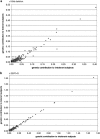Genealogical analysis as a new approach for the investigation of drug intolerance heritability
- PMID: 24281370
- PMCID: PMC4060120
- DOI: 10.1038/ejhg.2013.270
Genealogical analysis as a new approach for the investigation of drug intolerance heritability
Abstract
Genealogical analysis has proven a useful method to understand the origins and frequencies of hereditary diseases in many populations. However, this type of analysis has not yet been used for the investigation of drug intolerance among patients suffering from inherited disorders. This study aims to do so, using data from familial hypercholesterolemia (FH) patients receiving high doses of statins. The objective is to measure and compare various genealogical parameters that could shed light on the origins and heritability of muscular intolerance to statins using FH as a model. Analysis was performed on 224 genealogies from 112 FH subjects carrying either the low-density lipoprotein receptor (LDLR) prom_e1 deletion>15 kb (n=28) or c.259T>G (p.Trp87Gly) (n=84) mutations and 112 non-FH controls. Number of ancestors, geographical origins and genetic contribution of founders, inbreeding and kinship coefficients were calculated using the S-Plus-based GENLIB software package. For both mutations, repeated occurrences of the same ancestors are more frequent among the carriers' genealogies than among the controls', but no difference was observed between tolerant and intolerant subjects. Founders who may have introduced both mutations in the population appear with approximately the same frequencies in all genealogies. Kinship coefficients are higher among carriers, with no difference according to statins tolerance. Inbreeding coefficients are slightly lower among >15-kb deletion carriers than among c.259 T>G carriers, but the differences between tolerants and intolerants are not significant. These findings suggest that although muscular intolerance to statins shows a family aggregation, it is not transmitted through the same Mendelian pattern as LDLR mutations.
Figures





Similar articles
-
GENLIB: an R package for the analysis of genealogical data.BMC Bioinformatics. 2015 May 15;16:160. doi: 10.1186/s12859-015-0581-5. BMC Bioinformatics. 2015. PMID: 25971991 Free PMC article.
-
Abnormal regulation of the LDL-R and HMG CoA reductase genes in subjects with familial hypercholesterolemia with the "French Canadian mutation".Atherosclerosis. 1996 Jul;124(1):103-17. doi: 10.1016/0021-9150(96)05828-5. Atherosclerosis. 1996. PMID: 8800498
-
Influence of LDL receptor gene mutations and the R3500Q mutation of the apoB gene on lipoprotein phenotype of familial hypercholesterolemic patients from a South European population.Eur J Hum Genet. 2003 Dec;11(12):959-65. doi: 10.1038/sj.ejhg.5201079. Eur J Hum Genet. 2003. PMID: 14508510
-
New clinical perspectives of hypolipidemic drug therapy in severe hypercholesterolemia.Curr Med Chem. 2012;19(28):4861-8. doi: 10.2174/092986712803341485. Curr Med Chem. 2012. PMID: 22963620 Review.
-
Familial hypercholesterolemia and response to statin therapy according to LDLR genetic background.Clin Chem Lab Med. 2005;43(8):793-801. doi: 10.1515/CCLM.2005.134. Clin Chem Lab Med. 2005. PMID: 16201887 Review.
Cited by
-
GENLIB: an R package for the analysis of genealogical data.BMC Bioinformatics. 2015 May 15;16:160. doi: 10.1186/s12859-015-0581-5. BMC Bioinformatics. 2015. PMID: 25971991 Free PMC article.
References
Publication types
MeSH terms
Substances
LinkOut - more resources
Full Text Sources
Other Literature Sources
Medical
Miscellaneous

